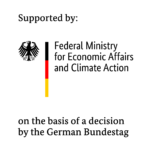Lifetime simulation of ion exchange filters
Development and validation of a simulation model to predict the lifetime of an ion exchange filter
Brief description
Whether in passenger cars, commercial vehicles, boats or special applications: Electrified powertrains such as fuel cells, battery systems, electric motors and power electronics must be protected from overheating and therefore require efficient cooling to ensure their longevity and safety requirements. In this context, the properties of the cooling medium, especially the electrical conductivity, strongly depend on the boundary conditions such as temperature and aging of the coolant and must already be taken into account during the design of the powertrain as well as the preparation of the maintenance plan. Coolants such as water-glycol mixtures, fluorinated fluids or cooling oils are often used for this purpose. To avoid effects such as corrosion and electrical short circuits, these fluids must maintain their dielectric properties over the intended operating time. Since impurities such as water, metallic particles or ions can lead to a degradation of the dielectric properties, the use of filters or separators in cooling circuits is common. Since these filters or separators can only remove a limited amount of contaminants, knowledge-based design of a filter or separator requires that the type and expected amount of contaminants for the intended change interval be known. Small and medium sized companies typically do not have this information.
Aims of the project
The aim of the project is to provide a method to correlate a possible change interval of a filter or a separator with its storage capacity. As a first application, the input of ions into cooling media for fuel cell systems as well as their removal by means of ion exchanger filters will be investigated. The aim is to create a model that can be individually adapted and scaled to different system architectures. This should reduce the effort for development and testing as well as the development time.
Arbeitsaufgaben OWI
- Collecting data on coolants, technical components and materials and analyzing possible causes of failures.
- Determination of further data through preliminary tests
- Development of static and dynamic methods and experiments to determine ion release of individual components or materials of the defined fuel cell powertrains as well as corrosion.
- Creation of simplified physical models of the technical components
- Experimental validation of the models at the component level.
Performing research centers
- OWI Science for Fuels gGmbH
- RWTH Aachen University, Lehrstuhl für Thermodynamik mobiler Energiewandlungssysteme
Project funding
The research project was initiated by FVV e. V. within the framework of joint industrial research and is financially supported by the German Federal Ministry of Economics and Climate Protection (project number IGF 22397 N). A committee of industry representatives headed by Dr. Michael Harenbrock, Principal Expert Electric Mobility at MANN+HUMMEL GmbH, is supporting the project.
Project durance
06/2022 until 11/ 2024
Contact
M.Sc. Karin Engeländer
Tel.: 02407/ 9518-148
E-Mail: K.Engelaender@owi-aachen.de
To the press release of the project


